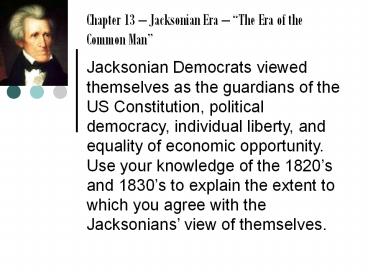Chapter 13 PowerPoint PPT Presentation
Title: Chapter 13
1
Chapter 13 Jacksonian Era The Era of the
Common Man
- Jacksonian Democrats viewed themselves as the
guardians of the US Constitution, political
democracy, individual liberty, and equality of
economic opportunity. Use your knowledge of the
1820s and 1830s to explain the extent to which
you agree with the Jacksonians view of
themselves.
2
The Election of 1824 The Corrupt Bargain
- JQ Adams (MS) Secretary of State under Monroe
- Henry Clay (KY) Speaker of the House
- William H Crawford (GA) Secretary of Treasury
(had a stroke, out) - A. Jackson (TN)
3
The Corrupt Bargain
- House of Representatives Choose between top
three candidates, run by Henry Clay Speaker.
Clay hated Jackson, but held commonalities with
JQ Adams - American System
- Nationalists
- Corrupt Bargain Clay threw support behind JQ
Adams, in return he would be made Sec. of State
(next step Prez)
Discussion Question Why was John Quincy Adams
called, the Minority President?
Andrew Jackson won the popular vote, but not the
electoral college
4
Accomplishments of John Quincy Adams
- Senate voted against Embargo of 1807
- Secretary of State
- Treaty of Ghent
- Adams-Onis Treaty
- Monroe Doctrine
5
Accomplishments of John Quincy Adams
- President 6 1825-29
- House of Representatives 8 terms
- Defense attorney in Amistad Slave Revolt Case
1841 - Had gag rule repealed
6
Beliefs of John Quincy Adams
- Second Bank of US
- Opposed annexation of Texas (anti-slavery)
- Nationalist (American System public University,
weather stations) - Sympathized with Indians
7
The Election of 1828 Adams v Jackson
8
Old Hickory as President
- Spoils System Turn the rascals out, put our
rascals in. - Effects How did the Spoils System help to
develop the new 2-party system? - Tariff of 1828 Passed under Adams and inherited
by Jackson. A protective tariff for business - What problem did the Old South have with the
tariff?
9
The Nullies v Jackson
- John C Calhoun (VP Under Adams and Jackson) wrote
South Carolina Exposition (1828) - Concurrent Majority a federal law that is
harmful to states can be declared null and void
via a convention of the people. - Jacksons Response Threatened military force
and Force Bill
What steps were taken to avoid a military
conflict?
10
The Hydra of Corruption The Bank Wars
- Nicholas Biddle President of Bank of US
- Functions print stable currency, keep federal
money, control gold and silver, source of credit - 1832 Clay and Webster wanted to use the renewal
of the charter to embarrass the President if he
passed the charter he would anger his followers,
if he vetoed it the wealthy would be upset. - How did the veto increase the power of President?
11
The Moneyed Monster The Bank War
- 1833 Jackson removed most Federal money from Bank
of US - Effect Panic of 1837 What did Biddle have to
do? - Pet Banks
- Specie Circular US Treasury required all new
land purchased be secured with gold or silver.
12
Jackson The Victor in the Bank War
Democratic cartoon from 1833 showing Jackson
destroying the bank, to the approval of the Uncle
Sam like figure to the right, and annoyance of
the bank's President, shown as the Devil himself.
13
Hydra of Corruption
14
Jackson and The Native Americans
- 1828 The Cherokee Tribes of Georgia wrote and
adopted a constitution with 3 branch government. - Georgia declared the Cherokee Assembly illegal
(SC ruled in favor of Indians) - Cherokee Nation v Georgia
- Worcester v Georgia
- Jacksons Response
- John Marshall had made his decision, now let him
enforce it.
How does this quote from Jackson show his
increasing strength as President?
15
Indian Removal Act of 1830
- 100,000 Indians moved from east of Mississippi
- 1832 Black Hawk War
- 1835-42 Osceola and Florida Seminoles
- 1838-39 Trail of Tears 15,000 Cherokees, 116
days 4,000 deaths
16
The Trail of Tears
17
Jacksonians on States Rights
- Charles River Bridge v. Warren Bridge (1837)
- States, not federal government, had power to
enter into contracts regarding infrastructure,
transportation. - Maysville Road Veto - I am not able to view the
Maysville Road Bill in any other light than as a
measure of purely local character.... It has no
connection with any established system of
improvements and is exclusively within the
limits of a State Kentucky....
18
The Era of the Common Man
- Social mixture
- Universal Male Suffrage
- Popular Campaigning
- Increased Power of President (through veto)
- Kitchen Cabinet
- Roger Taney in Supreme Court

